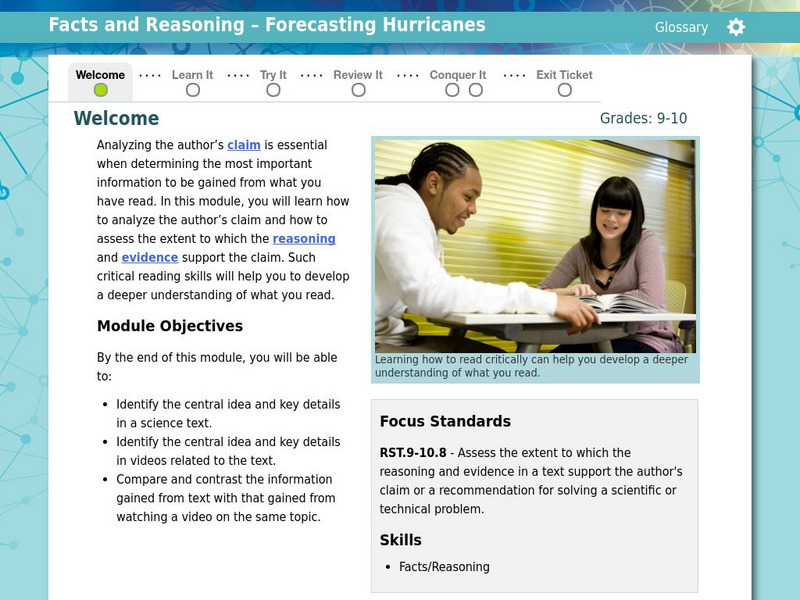NOAA
Noaa: Century's Top Weather, Water and Climate Events
Discover what experts view as the top weather related events of the 20th century, get background information on them and see photos. Some of the events covered are the Galveston Hurricane of 1900, the 1930s Dust Bowl, Hurricanes Camille...
Thinkport Education
Thinkport: Facts and Reasoning: Forecasting Hurricanes
In this science-themed literacy lesson about forecasting hurricanes, students identify the author's claim and how the author supports the claim with evidence and reasoning.
Other
Planet Ark: World Environmental News
Welcome to Planet Ark's daily Reuters World Environment News - the most comprehensive source of environmental news on the Net. To read previous news stories, please use the search engine below to find stories relating to any...
University Corporation for Atmospheric Research
Ucar: Hurricane Safety
If you live in an area that is affected by hurricanes, it is important that you and your family create a plan for what to do in a hurricane, and pull together an emergency supply kit.
University Corporation for Atmospheric Research
Ucar: Where Do Hurricanes Form
If you are looking for a hurricane, head to the tropics just north and south of the equator.
University Corporation for Atmospheric Research
Ucar: Hurricanes
A strong hurricane can spell disaster. These huge storms are the most powerful of all weather systems. Learn about how they form and the impacts they can have.
CK-12 Foundation
Ck 12: Earth Science: Severe Weather Study Guide
[Free Registration/Login may be required to access all resource tools.] This study guide summarizes the key points of thunderstorms, tornadoes, mid-latitude cyclones, hurricanes, blizzards, and heatwaves and droughts. Includes a few...
University Corporation for Atmospheric Research
Ucar: Hurricanes Impact Our Lives
Web weather site for kids highlights hurricanes. Discover how they are formed, the damage they can cause as well as read a weather story about surviving a hurricane.
Other
St. Petersburg Times: Hurricane Andrew, After the Storm
Hurricane Andrew struck southern Florida on August 24, 1992. As these articles explain, residents still feel the impact of the storm ten years later on many levels - the psychological toll, the cost of insurance, and in the need to...
University Corporation for Atmospheric Research
Ucar: Kids Crossing: Look Out for Dangerous Weather
Explore dangerous weather events like tornadoes, hurricanes, thunderstorms, and blizzards through stories, activities, and safety tips.
Alabama Learning Exchange
Alex: Exploring Weather Disasters
During this lesson, students will discover the differences in four types of weather disasters. They will collect information from selected Internet websites and create a multimedia presentation to demonstrate what they have learned.
Alabama Learning Exchange
Alex: Researching Hurricanes With Technology
This lesson will help students to understand the formation, power, and history of hurricanes. Students will do this using a combination of technological skills. Examples of technology used include: PowerPoint, Word, Netscape Composer,...
Alabama Learning Exchange
Alex: Are You Prepared?
Natural disasters come in many different forms. In order to be better prepared, students have to know the different types of disasters. In this lesson students will research natural disasters in order to create a brochure highlighting an...
University Corporation for Atmospheric Research
Ucar: What Causes Storm Surge?
Learn about the many factors that impact how much storm surge floods a coast as a hurricane or tropical storm comes ashore.
University Corporation for Atmospheric Research
Ucar: Make a Hurricane
The temperature of the sea, moisture in the air, and high winds all play a role in making a hurricane stronger or weaker. Drag the hurricane over the ocean to see what happens.
South Carolina Educational Television
South Caroline Etv Commission: Hurricane Basics | Nasa Online
Simulation provides details of hurricane parts, hurricane formation, and hurricane movement.
Scholastic
Scholastic: Tornado: Q & A
This is a question an answer concerning tornadoes including how they are formed, what the funnel looks like, how tornadoes end, which are more dangerous: tornado or hurricane, inside the "eye" of a hurricane or tornado, and more.
Concord Consortium
What Happens to the Energy of Water Molecules During Hurricanes?
How does energy charge when evaporation is reversed? and What powers a hurricane? are explored in this module.
Concord Consortium
Concord Consortium: What Makes Water Special?
In Activity 1 investigates How are water and other liquids similar and different? The student will see if ideas involving energy, electrostatic interactions, and atomic structure, can be used to explain why a hurricane is so powerful.
Concord Consortium
Concord Consortium: What Happens to the Energy of Water Molecules During Hurricanes?
In this investigation students will add energy to the model of how molecules interact by completing the following activities. Activity 1 What does boiling do to water molecules? Activity 2 How hot can water go? Activity 3 How does energy...
Louisiana Department of Education
Louisiana Doe: Louisiana Believes: English Language Arts: Grade 4: Hurricanes
Fourth graders learn about hurricanes and their impact on Louisiana as well as how historical accounts reflect the culture of Louisiana and give insight into historical events. This set builds on storytelling as a way to transmit...
PBS
Pbs Learning Media: Environmental Public Health: Natural Hazards
In this lesson plan, students are introduced to a variety of natural hazards and explore how understanding these threats make us better able to avoid or reduce their potential harmful impact.
Google
Louisiana Curriculum Hub: Ela Guidebooks: Grade 4: Surviving Hurricanes: Unit Files
A Google Drive folder with instructional presentations, discussion questions, student activities, and assessments for the text, Surviving Hurricanes.
Ready
Ready: Kids: Hurricanes
This resource explains hurricanes, are you at risk, as well as what you should do to protect yourself before, during, and after a hurricane.









